Why Do Guinea Pigs Poop So Much
When you gotta go, you gotta go, and guinea pigs go a lot! The average guinea pig will excrete 100-150 droppings a day, and to new cavy owners, this can be alarming.
If your guinea pig’s frequent bathroom breaks are what’s brought you here, we have good news.
This behavior is quite normal for cavies. In fact, one Cambridge University study found that a guinea pig’s digestive system is the fastest and most efficient in the rodent family.
By the end of this article, you’ll understand what causes a guinea pig to poop so frequently and how often you can expect them to do their business.
You’ll also be able to identify a healthy cavy poop from an unhealthy one, factors that affect how they eliminate, and care tips that will make you a guinea pig poop expert.
Why Is Your Guinea Pigs Poop So Much
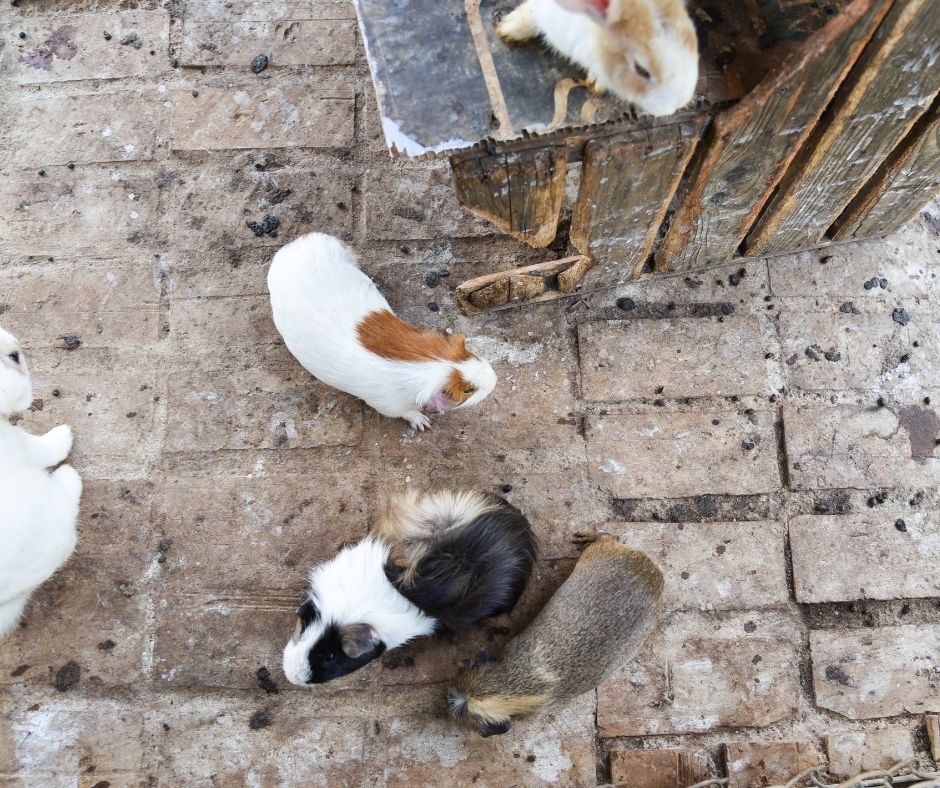
Guinea pigs poop so much because they also eat a lot (amount and times). There’s no need to panic if your guinea pig is pooping consistently and leaves pellets almost everywhere it goes. This is nothing out of the ordinary and considered natural for all rodents.
The total amount of poop a guinea pig will produce in a day varies from one cavy to the next and is mostly dependent on factors like diet and lifestyle. Generally, you can expect about 100 droppings a day or more.
With so much to nibble on, they’ll spend a majority of their day eating. Throw their impressively fast-working stomachs into the equation and you have the perfect solution for a sizable amount of guinea pig poo.
An adult guinea pig requires approximately ⅛ cup of pellet food per day supplemented by hay and vegetables.
If your guinea pig poops more frequently, it may also be eating more than usual. Their gastrointestinal tract is known to digest food materials at a fast rate, meaning their bodies will have no problem excreting any amount of food as quickly as it was consumed.
How Often Do Guinea Pigs Poop and Pee?
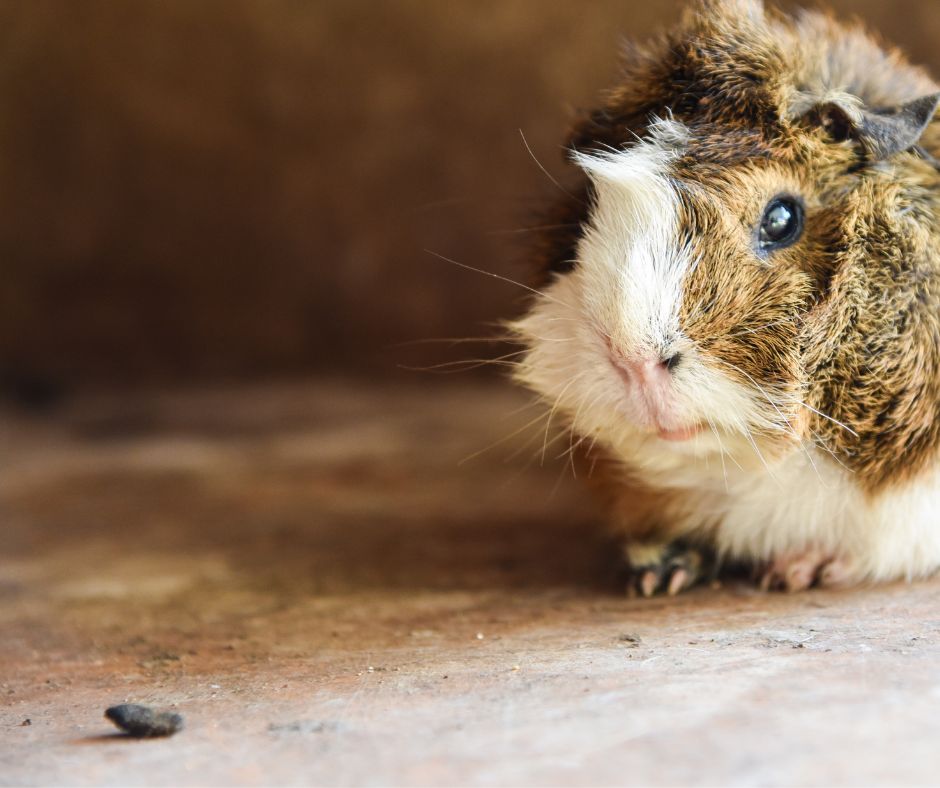
Guinea pigs are unique in that they eat a diet of high fiber foods which means their bowels functions more often than most animals. Guinea pigs poop more than 100 times in one day and pee about every 15 minutes. The frequency of guinea pig poop (or pee) depends on the individual.
Guinea pigs do not obey a bathroom schedule. Instead, they will poop throughout the day, anytime and anywhere they please.
Unlike most animals, cavies do not have regular pooping patterns and will discharge feces whenever they feel the urge. This means that whether your guinea pig is in its cage or exploring your home, you’ll likely find pellets in its trail.
In addition to the staggering amount of feces a cavy can produce, Guinea pigs will also eat their own poop. it is not the hard poop pellets they eat, but another kind of soft poop called a caecotroph, which is rich in vitamins and fatty acids. Owners do not normally see this soft poop as it is quickly eaten.
Guinea pigs are members of the coprophages family, and one of this group’s most distinguishable characteristics is a nutrient deficiency that drives them to eat their own droppings.
They’ll consume almost as much poop as they excrete each day, but it’s nothing to stress over. It’s very beneficial to their health, and it means that you’ll have less to clean up.
Factors That Can Affect a Guinea Pig’s Poop
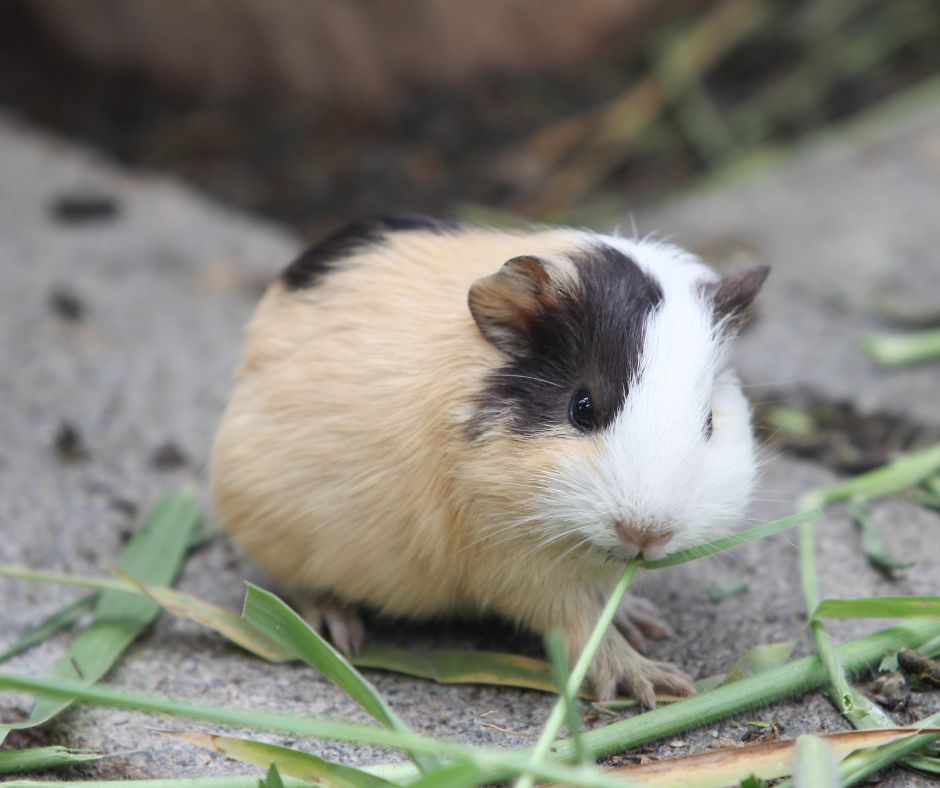
The frequency and quality of a guinea pig’s poop are determined by many factors, the most important of which are its exercise levels, age, diet, and weight.
If your guinea pigs spend a lot of time outside of their cage to play with their buddies or wander around, their bodies will become tired more quickly and try to recover lost energy by increasing their digestion rate.
This will result in the guinea pig receiving its essential nutrients and passing waste from the body much faster and more often.
Physiological factors such as stress and fear can also increase how much a guinea pig will excrete.
What Does Healthy Guinea Pig Poop Normally Look Like?
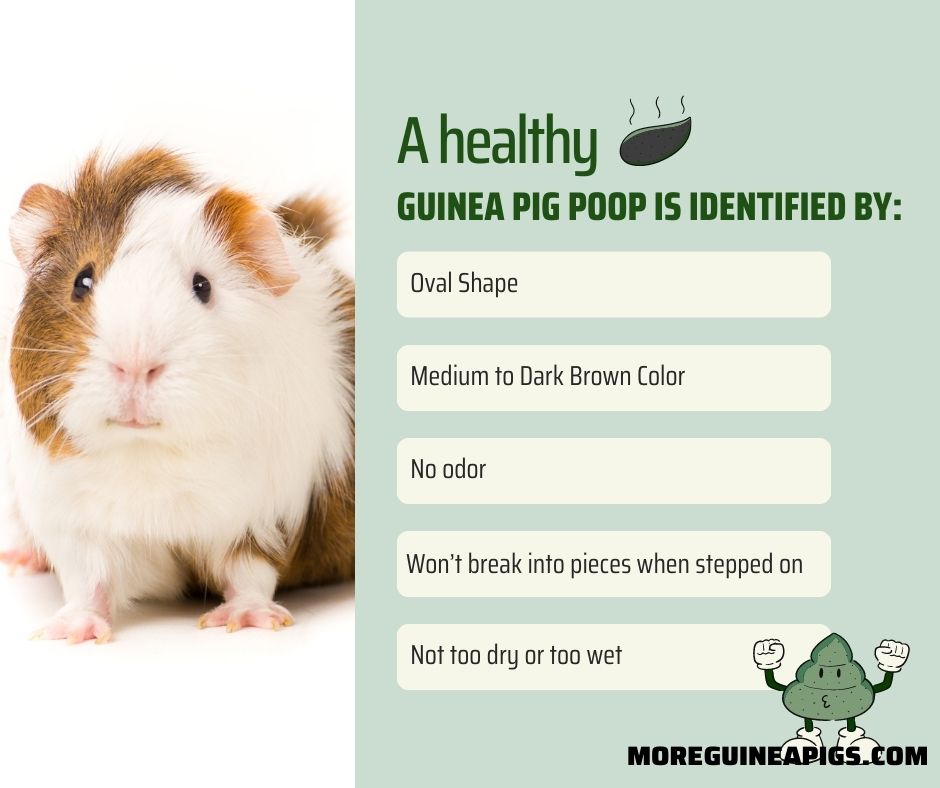
A healthy guinea pig poop is identified by:
- Oval Shape
- Medium to Dark Brown Color
- No odor
- Won’t break into pieces when stepped on
- Not too dry or too wet
If you notice that your guinea pig’s poop has a strange consistency, stinks, has an odd color, or appears to be bloody, it could indicate an improper diet, a gut problem, or a viral infection.
Make sure your guinea pig is getting enough hay and water. Reducing the number of fruits or other sensitive foods they consume can also prevent further issues. If the poop problems persist, we highly recommend a vet visit.
When Do You Need To Worry About Your Guinea Pig Pooping Too Much?

Frequent pooping is completely normal for guinea pigs and directly correlated to how much food they eat. Cavy owners should be more concerned when their pet isn’t pooping enough.
If a guinea pig’s pellet count is 50 or less a day, it could be a sign of stasis. This GI tract condition happens when the intestines are not contracting properly and might be one of the first indications of a more serious problem.
You can prevent stasis by adding more fiber to the guinea pig’s diet through an unlimited amount of fresh hay. If you notice that your guinea pig is eating and pooping less and showing signs of discomfort, you’ll want to schedule an appointment with your vet immediately.
How To Control Guinea Pig Poop?
It is possible to help your guinea pig poop less, but it’s not necessary. A guinea pig’s body is designed for food to move through it constantly, so your attempts to make them poop less probably won’t work. It could become unhealthy for the guinea pig over time.
If you want to minimize how much your guinea pig poops without affecting its health, we will start by feeding them a little less. How much a guinea pig poops is the result of how much they eat, after all.
Adding more fresh vegetables like carrots to their diet can also reduce how much they poop. Be careful not to feed them too much! Carrots are a source of carbohydrates for guinea pigs, which contain a lot of sugar.
Excess of sugar can promote the growth of gas-producing bacteria and disrupt their intestinal system.
You do have the option of training your guinea pig to use a litter box, but this process requires time and a lot of patience.
If this is something that you’re willing to try, start by placing a small and sturdy litter box in a dark space inside their cage.
Cavies are instinctually conscious of where they urinate since the smell can attract predators, and dark places are their favorite spots to take care of business. To help your guinea pig remember to use the litter box, mix the litter with fresh and old bedding to retain its scent.
It usually takes several months of training before a guinea pig will regularly use a litter box, so don’t get frustrated and be understanding with your pet.
kathson Triangle Potty Trainer Corner Bunny Toilet Guinea Pig Litter Bedding Plastic Box
How To Clean Guinea Pig Poop
Cleaning up poop isn’t the most glamorous part of being a guinea pig owner, but it’s certainly one of the most important.
Leaving feces in a guinea pig’s cage for too long can be hazardous to their health. Since they drop around 100 pellets a day, you’ll have a lot of poop to keep up with.
It’s recommended that you clean your guinea pig’s enclosure at least once a day. If you have more than one cavy in the same enclosure, cleaning will need to be done several times a day.
The quickest and easiest way to clean your guinea pig’s cage or droppings around the house is with a handheld vacuum. Make sure it’s not too big! You don’t want to suck away everything inside their cage.
Before you begin, remove your guinea pigs from the enclosure and place them somewhere they’ll be safe and comfortable while you clean, preferably away from the noise.
If you use hay in their home, Remove soiled hay and replace it with fresh hay regularly.
Be sure to take your time and do a thorough job. It shouldn’t take longer than a few minutes. Cleaning guinea pig poop with a scoop or a small broom and dustpan requires a little more time than a handheld vacuum but will work just as well.
Canvas Bottom (Replacement Part) for Guinea Pig Habitat
Are Guinea Pig Feces Harmful to Humans?
In general, guinea pig poop and urine are not toxic to breathe. Though they rarely pass illnesses onto their owners, some potential health risks associated with exposure to their waste.
The bacteria in pig’s poop can be harmful to humans. One example is salmonella, which often leads to fever when ingested by someone who doesn’t have a good immune system or bumps into surfaces that are infected with it while cleaning up after their pet!
For these reasons, it’s important to clean up after your pet guinea pig regularly and to wash your hands after handling them or their cage. If you have any concerns about your health after exposure to guinea pig waste, be sure to talk to your doctor.
In Summary
Guinea pigs are frequent poopers and can produce up to 150 droppings a day. They’re known to do their business consistently and without warning, but some factors can affect how often they poop, including how much they eat, their lifestyle, and age.
It’s possible to control the frequency of your guinea pig’s bathroom breaks, but only to an extent. If you want to clean less poop, reduce how much food you’re giving it or train it to use a litter box.
When cleaning the feces that your guinea pig has left behind, the best and fastest method will be using a handheld vacuum, but a scoop or small broom and dustpan will also get the job done.
Be sure to clean their cage at least once a day to keep your guinea pigs’ healthy and happy.




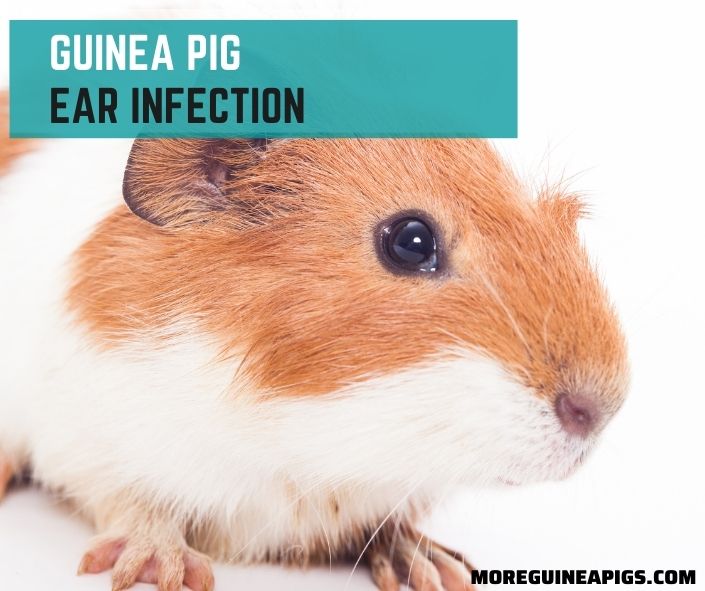



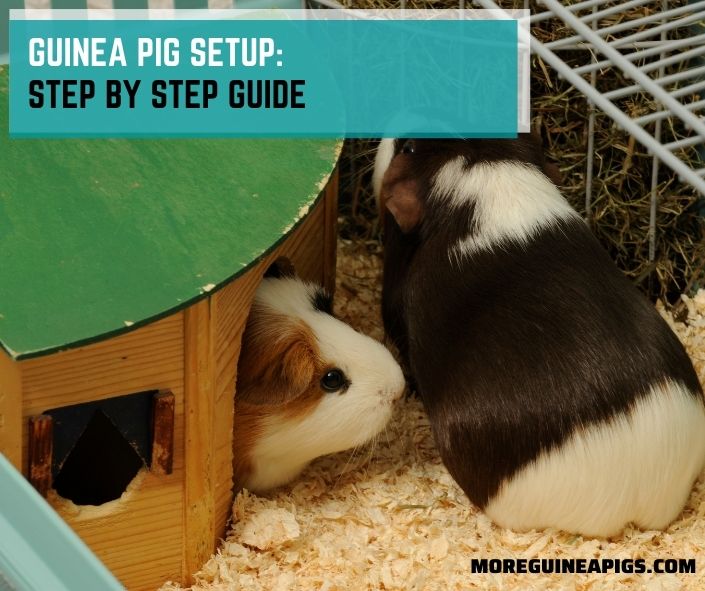
10 Comments
Comments are closed.